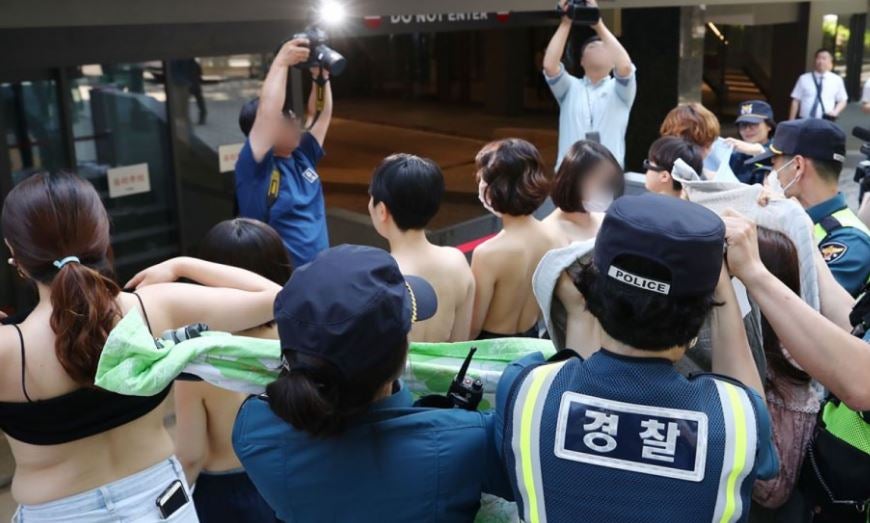Women stage topless protest over Facebook 'discrimination' in South Korea
Facebook Korea deleted pictures the feminist group shared on their Facebook page – saying the image violated its regulations on nude images and sexual activities

Your support helps us to tell the story
From reproductive rights to climate change to Big Tech, The Independent is on the ground when the story is developing. Whether it's investigating the financials of Elon Musk's pro-Trump PAC or producing our latest documentary, 'The A Word', which shines a light on the American women fighting for reproductive rights, we know how important it is to parse out the facts from the messaging.
At such a critical moment in US history, we need reporters on the ground. Your donation allows us to keep sending journalists to speak to both sides of the story.
The Independent is trusted by Americans across the entire political spectrum. And unlike many other quality news outlets, we choose not to lock Americans out of our reporting and analysis with paywalls. We believe quality journalism should be available to everyone, paid for by those who can afford it.
Your support makes all the difference.A group of women have staged a topless protest in South Korea against Facebook for banning posts displaying women’s breasts yet allowing men to flaunt their naked torsos.
Ten members of a feminist activist group called Fire Femi Action gathered near the tech giant’s headquarters in the Gangnam district of Seoul.
They wore masks and sunglasses and clutched signs emblazoned with “Why do you delete posts in which I willingly showed my breasts?”.
The protesters, who chanted “My body is not porn”, assembled to show their opposition to the social media site's policy of deleting photos of their topless bodies captured during a previous protest.
After police and photographers appeared at the latest protest, the demonstrators took off their T-shirts to display a Korean character drawn on their chests saying “My body is not pornographic material”.
Police responded by covering the women with blankets by force – prompting some of them to shout “Why are police officers covering us? Why do they keep suppressing us?”
The protest came after Facebook Korea deleted pictures the feminist group shared on their Facebook page – saying the image violated its regulations on nude images and sexual activities and suspending the account for one month.
But the demonstration prompted Facebook Korea to apologise and restore the original posts it had deleted.
“Photographs that show much of a bare body are automatically deleted by the algorithm. The pictures (posted by Fire Femi Action) carry social messages, so we restored them,” Facebook Korea said in a statement.
“This content was removed in error. Our nudity policies have become more nuanced over time," a spokesperson for Facebook in the UK told The Independent.
"We understand that nudity can be shared for a variety of reasons, including as a form of protest. Where such intent is clear, we make allowances for the content. But it’s clear we’re not perfect when it comes to enforcing our policy. Often there are close calls - and sometimes we get it wrong. We have restored the content and said sorry to the user.”
The feminist group held a “menstruation festival” back in May in order to show periods should not be seen as a taboo. Some women chose to take off their shirts at the festival and then posted images on their Facebook page afterwards.
In one of the since deleted posts, Fire Femi Action said it was not fair to consider photos of shirtless women “obscene material” when men’s topless bodies are deemed normal.
“We can easily and often see men playing sports with their shirts off in basketball courts and soccer fields. But for women, it is socially demanded that our bodies be sexily revealed and be hidden for chastity at the same time,” said the post.
“Pictures of naked woman are often perceived as obscene material and are deleted from online sites, or become content for public shame among men, with the nipples blurred.”
This comes after an Australian mother of four was banned from Facebook for sharing an article on breastfeeding in a private group on the social media site last October.
Facebook told Kerryn Gill-Rich it was because the pictures accompanying the article on vasospasm – more commonly known as nipple blanching – a condition that occurs in breastfeeding women when blood flow to the nipple is limited, were in violation of its nudity policy.
The article contained medical information written by a certified lactation consultant on the issue, how women could deal with it, and images of blanched nipples as a reference. Ms Gill-Rich tried to share the article twice in the Breastfeeders in Australia group and was banned for a week for each instance of attempted sharing.
Join our commenting forum
Join thought-provoking conversations, follow other Independent readers and see their replies
Comments